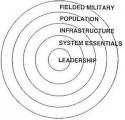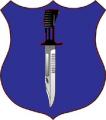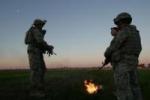but at least I found a starting point for something I understand - Human Terrain Mapping, as most simply exemplified by the map of Sunni, Shia and mixed areas (p.19 of article); but more specifically:
This seems a valid enough use of applying graphics (overlays, etc.) to show demonstratively the relationships between the population and its terrain (geography).Defining Tactical Human-Terrain Mapping
TF Dragon executed its data-collection effort through systematic people-to-people contact. The staff planned decentralized platoon-level patrols, conducted during daylight hours, that sought answers to specific questions about the population. These specific “information requirements” (IR) about each separate village and town included—
The boundaries of each tribal area (with specific attention to where they adjoined or overlapped).
Location and contact information for each sheik or village mukhtar and any other important people (government officials, Iraqi Security Forces, etc.).
Locations of mosques, schools, and markets.
Identification of the population’s daily habits (when they woke up, slept, shopped, etc.).
Nearest locations and checkpoints of Iraqi Security Forces.
Economic driving force (i.e., occupation and livelihood).
Employment and unemployment levels.
Population flow (i.e., people moving in or out of the AO).
Anti-coalition presence and activities.
Access to essential services (fuel, water, emergency care, fire response, etc).
Particular local population concerns and issues.
IIRC (always dangerous), something akin to that was suggested within the last two decades in Egypt by some civilian assistance agency re: the problem of collecting taxes, property ownership, etc. Seems Egypt had no records id'ing who lived where, owned what, leased what, etc. Solution (which I can't recall whether implemented or not) was what any rum-dum county tax equalization department has - a database of property "cards" mapping the data against the terrain (plat maps).
Seems that "Human Terrain" has morphed beyond those concepts into something I don't understand.
Agree with slap:
You don't need 14 college degrees either. I know some double clutchin detectives that could run most intell ops with 3x5 cards and I don't think there is a college degree between the whole bunch of them. But if you ended up on there to do list....they would map your terrain alright.















 . One things I've noticed is that when you are marketing something, you aim towards the targets prejudices....
. One things I've noticed is that when you are marketing something, you aim towards the targets prejudices....
Bookmarks